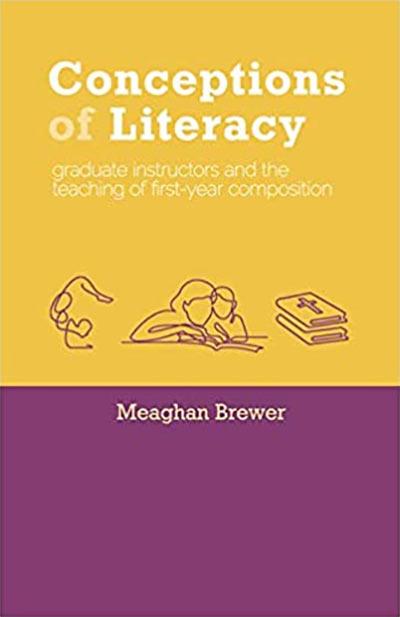

Conceptions Of Literacy: Graduate Instructors And The Teaching Of First-Year Composition
Meaghan Brewer
Assistant Professor/Director, Writing-Enhanced Course Program (NYC), English, (NYC)

What is the central theme of your book?
The central idea is that writing instructors—or really, anyone teaching literacy—have something I call “conceptions of literacy,” which are attitudes and beliefs about literacy, that largely determine how they teach writing (I focus on first-year composition courses), even in the face of countering views.
What inspired you to write this book?
As a graduate student, I set up a writing center at a local elementary school and worked with pre-service teachers. I asked the teachers to develop and teach lesson plans for the middle-schoolers there, and I was often surprised at the choices they made. As soon as I began asking them how they decided to teach what they were teaching, I recognized that their pedagogical choices reflected different ways of valuing literacy, and that my hesitance about some of these choices reflected differences between how I conceptualized literacy and how they did.
Why is this book important in your field? What does it contribute to the current body of knowledge on its topic?
My field, composition studies, is deeply invested in how we educate writing instructors, and there is a really vast body of work on what this means and how difficult teacher education is to accomplish in what is often a very compressed time period. Conceptions of Literacy is the first book on graduate instructors learning to teach first-year writing that uses a literacy studies lens to describe and categorize their experiences. Essentially, it offers a heuristic for understanding graduate instructors’ experiences that I think will be useful for writing program administrators and others who mentor writing instructors.
Were students involved in any research related to your book?
My book is based on a study I did of seven graduate instructors who were teaching first-year composition for the first time, and many of them read drafts of my chapters during the process.
Can you share a special moment when writing this book?
One moment that stands out is when I decided to cut out most of the methods section of my book. The book is based on my dissertation, which was 460 pages. I spent a long time cutting it down to a book that is now under 200 pages.
What is the one thing you hope readers take away from your book?
I hope that everyone who reads the book sees something of themselves in one of the participants in my study, and starts to realize that we all have ideological lenses we use to see literacy, which affect how we teach and learn.
What other books have you had published?
This is my first book! Prior to this, I had articles published in Peitho, Composition Studies, Applied Linguistics Review, the Journal of Adolescent & Adult Literacy, and Composition Forum.
The central idea is that writing instructors—or really, anyone teaching literacy—have something I call “conceptions of literacy,” which are attitudes and beliefs about literacy, that largely determine how they teach writing.
Fun Facts
When did you join Dyson College?
In fall 2013.
What motivates you as a teacher?
I like getting to the student who initially seems resistant, the one who is perhaps only taking the course to fulfill a requirement—or who might have had negative experiences with writing before—and who, by the end of the semester, is surprised at how far they come as a writer.
What do you do in your spare time; to relax/unwind?
I have two young children, so I don’t have much spare time, but I do like to try to get out every day for a run.
What are you reading right now?
I’m reading a book called The Giver of Stars by Jojo Moyes. It’s not exactly what I thought it would be, but I waited so long to get it from the library that I’m determined to finish it!